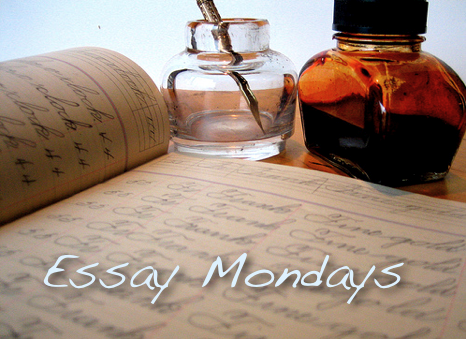
(Each week I read four essays from Philip Lopate's anthology The Art of the Personal Essay, and write about the one I find the most compelling.)
I remarked at the end of last week that I've been meaning to check out the novels of eighteenth-century writer Maria Edgeworth. Well, after getting a taste of her sparking wit from Lopate's collection, that desire is redoubled. Dorothy of Of Books and Bicycles remarked that Edgeworth is "a really good writer who gets overshadowed by Austen who lived around the same time," and there were definitely things about Edgeworth's piece (entitled "An Essay on the Noble Science of Self-Justification") that reminded me of Austen, in all the best ways: the crackling satire, the arch repartee, the keen eye for domestic details and all the ways in which marriages can go horribly wrong. Being an essay, though, it's both more direct and more devious than eighteenth-century novels usually are, and I quite enjoyed the multi-level satire Edgeworth conjured up.
"An Essay on the Noble Science of Self-Justification" purports to be an instructional piece addressed to young married ladies (or ladies about to be married) on the best ways in which to confound, manipulate, and triumph over their husbands. Edgeworth's basic conceit is that all women take for granted the principle "A woman can do no wrong," and because men will sometimes use underhanded tricks like "logic" and "reason" to disprove that principle, women have to be constantly on the offensive to protect it. Edgeworth deftly conjures up every trick in the shrewish book for getting your own way at the expense of another person:
Begin by preventing, if possible, the specific statement of any position, or if reduced to it, use the most general terms, and take advantage of the ambiguity which all languages and which most philosophers allow. Above all things, shun definitions; they will prove fatal to you; for two persons of sense and candor, who define their terms, cannot argue long without either convincing, or being convinced, or parting in equal good-humor; to prevent which, go over and over the same ground, wander as wide as possible from the point, but always with a view to return at last precisely to the same spot from which you set out. I should remark to you, that the choice of your weapons is a circumstance much to be attended to: choose always those which your adversary cannot use. If your husband is a man of wit, you will of course undervalue a talent which is never connected with judgment: "for your part, you do not presume to contend with him in wit."
Or again:
Nothing provokes an irascible man, interested in debate, and possessed of an opinion of his own eloquence, so much as to see the attention of his hearers go from him: you will then, when he flatters himself that he has just fixed your eye with his very best argument, suddenly grow absent--your house affairs must call you hence--or you have directions to give to your children--or the room is too hot, or too cold--the window must be opened--or door shut--or the candle wants snuffing.
Obviously, the first level of Edgeworth's satire deals with how ridiculous can be that behavior most often presented as feminine, and how the only explanation for much of the emotional blackmail practiced in relationships is base self-interest. As might be suggested by Edgeworth's note about "two people of sense and candor, who define their terms," her underlying argument is for both parties in a marriage to relate honestly and candidly with one another, and relate to one another reasonably, as proper citizens of the Age of Reason.
And as Lopate points out in his introduction, although her criticisms appear at first to be all directed towards women (the satirical criticism of female illogic was a popular genre at the time), there is a subtler strain that suggests she's not letting husbands off the hook, either. Much of her "advice" involves taking advantage of the leeway given to women as the "weaker" sex: preying on husbands' beliefs that you, as a wife, are delicate, illogical, overly emotional, etc. By writing in such a deliberate way as a woman, Edgeworth makes a convincing argument that marriages would be more equable if this leeway were abolished--that women would act more adult if they were not viewed socially as children. All in all, a super-smart, amusing essay! I will definitely be checking out Edgeworth's Belinda one of these days.
Up next week: I'm plunging head-first into Romanticism, with three essays by Charles Lamb versus one by William Hazlitt.
Badge photo courtesy of Liz West:

